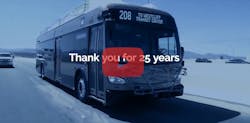RTC Celebrates 25 Years as Transit Agency for Southern Nevada
On Tuesday, December 5, the Regional Transportation Commission of Southern Nevada celebrated its 25th anniversary as the transit agency for the Las Vegas Valley. To mark the occasion, RTC staff spent the day traveling to various locations throughout the transit system in branded community outreach vehicles to thank customers for riding.
A total of ten surprise celebrations were held featuring donated giveaways, complimentary transit passes and the opportunity to win one of several grand prizes including one year of free transit. In addition, McDonald’s provided complimentary breakfast items to riders traveling through the Bonneville Transit Center, the RTC’s largest transit center.
“It may be the anniversary of the transit system, but we wanted to celebrate the people who have made our system successful — our riders,” said Tina Quigley, RTC general manager. “We have achieved a lot of milestones in our 25 years, but I am even more excited for the next 25 years given the unbelievable advancements in technology that will transform transportation, and transit, as we know it.”
Considered one of the younger transit systems in the country, the RTC has grown to include 39 routes with more than 3,400 bus stops, provides more than 64 million passenger trips each year and is ranked as the 15th busiest bus system in the nation by the National Transit Database. The following are several examples of how much the system has grown over the last 25 years:
Routes:
- 1992: 21, short, indirect routes
- Now: 39 routes in primarily straight lines along major arterials across the valley
Ridership:
- 1992: 19.4 million passenger trips per year
- Now: 64 million passenger trips per year
Service:
- 1992: 574,000 service hours per year
- Now: 1,685,000 service hours per year (nearly triple the amount from 1992)
- 1992: One frequent service route and one 24-hour route
- Now: Nine frequent service routes and 13 24-hour routes
“To help put this growth into perspective, a person using transit on some of the valley’s busiest arterials at noon on a weekday in 1992 had to wait up to one hour for a bus,” remarked Jacob Simmons, RTC senior transit operations planner. “Today, that wait time is no more than 15 minutes.”
In recent years, the RTC has added three new residential routes to meet increased demand for transit services in fast growing areas of the valley. The first to launch was Route 120 (Fort Apache / Rampart) in 2014. It was followed by Routes 121 (Durango / Buffalo) and 122 (Maryland Parkway / Horizon Ridge) over the next two years. In addition, the RTC recently launched four Golden Knights Express routes for the duration of the 2017 – 2018 Vegas Golden Knights inaugural season that each provide non-stop service to T-Mobile Arena.
With six transit facilities throughout the Las Vegas Valley, the RTC opened its newest one in Downtown Summerlin earlier this fall. Last year, the RTC celebrated the opening of the Mobility Training Center, which offers two working buses indoors to provide a firsthand transit boarding and farebox experience to help individuals, especially senior residents and persons with disabilities, have the confidence to use fixed-route transit services.
The RTC has also made a commitment to leveraging technology to improve the customer experience. In late 2016, the agency introduced rideRTC, a mobile ticketing and trip planning app that has been downloaded more than 100,000 times and sold more than 218,000 bus passes since it launched.
This year, the RTC debuted free Wi-Fi on all of its fixed-route vehicles, providing a valued customer amenity and an important operational benefit that enables better real-time tracking of transit vehicles as well as on-board, automated scanning of rideRTC mobile passes.
In addition, the RTC recently partnered with AAA, Keolis and the City of Las Vegas to launch the first driverless shuttle that runs in mixed traffic along a 0.6 mile route in downtown Las Vegas. The RTC remains committed to supporting advanced transportation technologies to gain insight on the customer experience and evaluate the possibility of future autonomous transit options.
Looking to the future, the RTC is in the midst of working with the community to develop a comprehensive transit plan for Southern Nevada called On Board. This visionary plan will identify how enhancements to the current bus system, new high capacity transit services and emerging transit technologies can improve future mobility and accessibility for the region’s residents and visitors.
